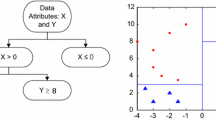Abstract
Discovering and extracting knowledge from large databases are key elements in granular computing (GrC). The knowledge extracted, in the form of information granules can be used to build rule-based systems such as Fuzzy Logic inference systems. Algorithms for iterative data granulation in the literature treat all variables equally and neglects the difference in variable importance, as a potential mechanism to influence the data clustering process. In this paper, an iterative data granulation algorithm with feature weighting called W-GrC is proposed. By hypothesising that the variables or features used during the data granulation process can have different importance to how data granulation evolves, the weight of each feature’s influence is estimated based on the information granules on a given instance; this is updated in each iteration. The feature weights are estimated based on the sum of within granule variances. The proposed method is validated through various UCI classification problems:- Iris, Wine and Glass datasets. Result shows that for certain range of feature weight parameter, the new algorithm outperforms the conventional iterative granulation in terms of classification accuracy. We also give attention to the interpretability-accuracy trade-off in Fuzzy Logic-based systems and we show that W-GrC produces higher classification performance - without significant deterioration in terms of its interpretability (Nauck’s index).
Access this chapter
Tax calculation will be finalised at checkout
Purchases are for personal use only
Similar content being viewed by others
References
Ahmad, S.S.S., Pedrycz, W.: Data and feature reduction in fuzzy modeling through Particle Swarm Optimization. Appl. Comput. Intell. Soft Comput. (2012)
Hu, J., Li, T., Wang, H., Fujita, H.: Hierarchical cluster ensemble model based on knowledge granulation. Knowl.-Based Syst. 91, 179–188 (2016)
Pedrycz, W., Bargiela, A.: Granular clustering: a granular signature of data. IEEE Trans. Syst. Man Cybern. Part B: Cybern. 32(2), 212–224 (2002)
Panoutsos, G., Mahfouf, M.: A neural-fuzzy modelling framework based on granular computing: concepts and applications. Fuzzy Sets Syst. 161(21), 2808–2830 (2010)
Huang, J.Z., Ng, M.K., Rong, H., Li, Z.: Automated variable weighting in k-means type clustering. IEEE Trans. Pattern Anal. Mach. Intell. 27(5), 657–668 (2005)
Rubio-Solis, A., Panoutsos, G.: Granular computing neural-fuzzy modelling: a neutrosophic approach. Appl. Soft Comput. 13(9), 4010–4021 (2013)
Baraka, A., Panoutsos, G., Mahfouf, M., Cater, S.: A Shannon entropy-based conflict measure for enhancing granular computing-based information processing. In: 2014 IEEE International Conference on Granular Computing (GrC), pp. 13–18 (2014)
Rubio-Solis, A., Panoutsos, G.: An ensemble data-driven fuzzy network for laser welding quality prediction. In: 2017 IEEE International Conference on Fuzzy Systems (FUZZ-IEEE), pp. 1–6 (2017)
Wu, Z., Li, C., Zhou, F., Liu, L.: A new weighted fuzzy c-means clustering approach considering between-cluster separability. J. Intell. Fuzzy Syst. 40(1), 1017–1024 (2021)
Amorim, R.: Feature relevance in Ward’s hierarchical clustering using the Lp norm. J. Classif. 32, 46–62 (2015)
Iliadis, L., Skopianos, S., Tachos, S., Spartalis, S.: A fuzzy inference system using Gaussian distribution curves for forest fire risk estimation. In: Papadopoulos, H., Andreou, A.S., Bramer, M. (eds.) AIAI 2010. IAICT, vol. 339, pp. 376–386. Springer, Heidelberg (2010). https://doi.org/10.1007/978-3-642-16239-8_49
Muda, M.Z., Panoutsos, G.: An entropy-based uncertainty measure for developing granular models. In: 2020 7th International Conference on Soft Computing & Machine Intelligence (ISCMI), pp. 73–77 (2020)
Xing, H., Ha, M., Tian, D., Hu, B.: A novel support vector machine with its features weighted by mutual information. In: 2008 IEEE International Joint Conference on Neural Networks (IEEE World Congress on Computational Intelligence), pp. 315–320 (2008)
Alkhodari, M., Islayem, D.K., Alskafi, F.A., Khandoker, A.H.: Predicting hypertensive patients with higher risk of developing vascular events using heart rate variability and machine learning. IEEE Access 8, 192727–192739 (2020)
Fernando, H., Marshall, J.: What lies beneath: material classification for autonomous excavators using proprioceptive force sensing and machine learning. Autom. Constr. 119 (2020)
Wang, Y., Cang, S., Yu, H.: Mutual information inspired feature selection using kernel canonical correlation analysis. Expert Syst. Appl. X 4 (2019)
Dousthagh, M., Nazari, M., Mosavi, A., Shamshirband, S., Chronopoulos, A.T.: Feature weighting using a clustering approach. Int. J. Model. Optim. 9(2), 67–71 (2019)
Shukla, P., Tripathi, S.: A review on the interpretability-accuracy trade-off in evolutionary multi-objective fuzzy systems (EMOFS). Information 3, 256–277 (2012)
Razak, T.R., Garibaldi, J., Wagner, C., Pourabdollah, A., Soria, D.: Interpretability indices for hierarchical fuzzy systems. In: IEEE International Conference on Fuzzy Systems (FUZZ-IEEE 2017) (2017)
Nauck, D.D.: Measuring interpretability in rule-based classification systems. In: The 12th IEEE International Conference on Fuzzy Systems, vol. 1, pp. 196–201 (2003)
Acknowledgement
This research is sponsored by Universiti Teknologi MARA, Ministry of Education, Malaysia and The University of Sheffield, UK.
Author information
Authors and Affiliations
Corresponding author
Editor information
Editors and Affiliations
Rights and permissions
Copyright information
© 2022 The Author(s), under exclusive license to Springer Nature Switzerland AG
About this paper
Cite this paper
Muda, M.Z., Panoutsos, G. (2022). An Evolving Feature Weighting Framework for Granular Fuzzy Logic Models. In: Jansen, T., Jensen, R., Mac Parthaláin, N., Lin, CM. (eds) Advances in Computational Intelligence Systems. UKCI 2021. Advances in Intelligent Systems and Computing, vol 1409. Springer, Cham. https://doi.org/10.1007/978-3-030-87094-2_1
Download citation
DOI: https://doi.org/10.1007/978-3-030-87094-2_1
Published:
Publisher Name: Springer, Cham
Print ISBN: 978-3-030-87093-5
Online ISBN: 978-3-030-87094-2
eBook Packages: Intelligent Technologies and RoboticsIntelligent Technologies and Robotics (R0)




